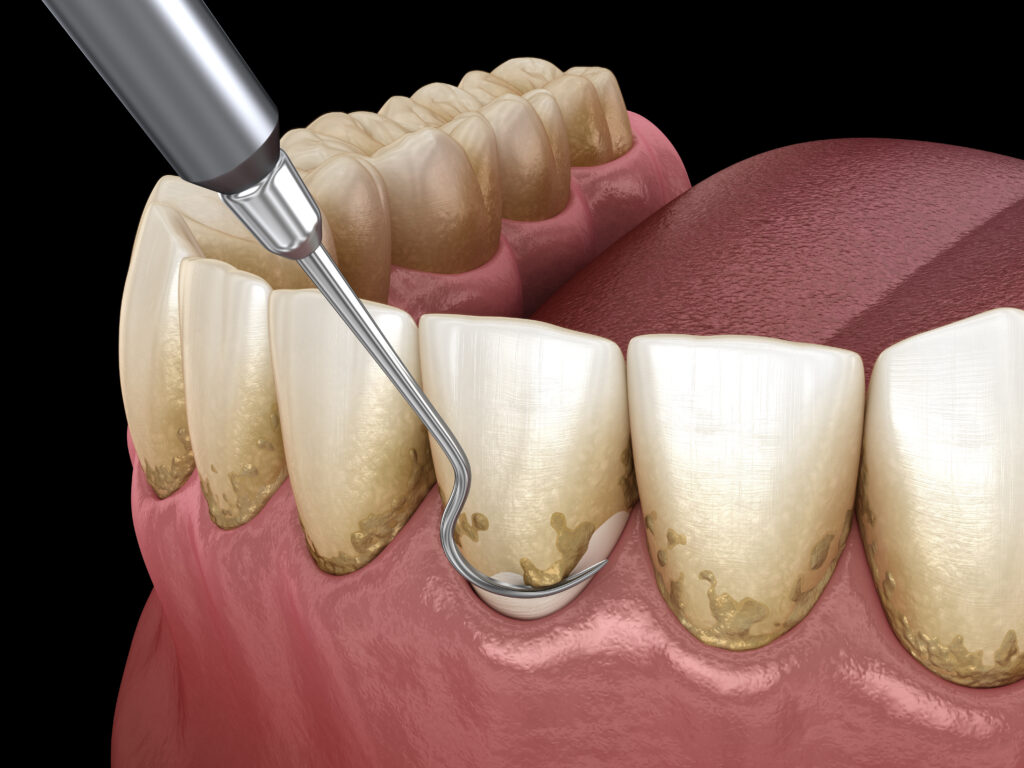(801) 212-9061
7555 Center View Ct Suite 104 West Jordan, UT 84084
Gum Disease Treatment in West Jordan

Gum disease, also known as periodontal disease, is a common but serious condition that affects the gums and bones supporting the teeth. It ranges from simple gum inflammation (gingivitis) to more severe forms (periodontitis), which can lead to tooth loss if untreated.
If you or your loved one may be experiencing gum disease, contact our office today to schedule a consultation at (801) 212-9061.
Stages of Gum Disease
- Gingivitis: This initial stage is marked by red, swollen gums that may bleed during brushing or flossing. It’s primarily caused by plaque buildup at the gumline. Gingivitis can often be reversed with professional cleanings and improved oral hygiene.
- Periodontitis: If left untreated, gingivitis can advance to periodontitis. In this stage, the inner layer of the gum and bone pull away from the teeth, forming pockets that can become infected. As the immune system fights the bacteria, the connective tissue and bone that hold teeth in place begin to break down. If not treated, this can lead to tooth loss.
Non-Surgical Treatments
- Professional Cleaning: Regular cleanings by a dentist or dental hygienist are crucial in preventing and managing gingivitis. This involves removing plaque and tartar from above and below the gum line.
- Scaling and Root Planing: This deeper cleaning procedure is performed under local anesthesia. Scaling involves removing tartar from above and below the gumline, while root planing smooths rough spots on tooth roots, removing bacteria and providing a clean surface for the gums to reattach to the teeth.
Surgical Treatments
- Flap Surgery/Pocket Reduction Surgery: In this procedure, the gums are lifted back, and tartar is removed from deeper pockets. The gums are then sutured in place to fit snugly around the tooth. This surgery can reduce pocket size and make it easier to keep clean.
- Bone and Tissue Grafts: These procedures are used to regenerate any bone or gum tissue lost to periodontitis. Bone grafting, using fragments of your own bone, synthetic bone, or donated bone, can help promote bone regrowth, enhancing the stability of teeth. Soft tissue grafts can reinforce thin gums or fill in places where gums have receded.
Additional Therapies
- Medications: In some cases, medications might be prescribed in conjunction with scaling and root planing. These can include antibiotic gels, prescription antimicrobial mouthwashes, or oral antibiotics.
- Laser Treatment: Emerging treatments like laser therapy can be used to remove diseased gum tissue and promote regeneration of healthy tissue.

Common Misconceptions about Gum Disease Treatment
Misconception: Gum Disease is Not Common
Fact: Gum disease is extremely common and can affect anyone, often without causing pain or noticeable symptoms in its early stages.
Misconception: Treatment for Gum Disease is Painful
Fact: Modern dental techniques and anesthesia options make gum disease treatments more comfortable than many people anticipate.
Misconception: Once Treated, Gum Disease Doesn’t Recur
Fact: Gum disease can recur if ongoing maintenance and good oral hygiene practices are not followed. Regular dental check-ups are important.
Treating gum disease is important not only for maintaining healthy gums but also for the overall well-being of your teeth and mouth.
If you are concerned about gum disease? Call today to schedule a Free consultation at (801) 212-9061.
Frequently Asked Questions
Gum disease, also known as periodontal disease, is an infection of the gums that can progress to affect the bone that surrounds and supports your teeth. It is usually caused by poor oral hygiene, which allows plaque—a sticky film of bacteria—to build up on the teeth and harden. Other contributing factors can include smoking, hormonal changes, genetics, certain illnesses, and medications. Gum disease ranges from simple gum inflammation (gingivitis) to more serious disease (periodontitis), which can lead to tooth loss.
Symptoms of gum disease include red, swollen, or tender gums, bleeding while brushing or flossing, receding gums, persistent bad breath, loose or shifting teeth, and changes in the way teeth fit together. Early stages of gum disease may be painless, so regular dental check-ups are important for early detection.
Gum disease is diagnosed through a dental exam, which includes checking for signs of inflammation, measuring the depth of the pockets around your teeth (where gums have pulled away from the teeth), and sometimes taking X-rays to check bone loss.
Treatment for gum disease depends on its severity. Early stages (gingivitis) can usually be reversed with professional cleaning and good home care. Advanced gum disease (periodontitis) may require more extensive treatment, like deep cleaning (scaling and root planing), medication, or even surgical interventions.
Scaling and root planing is a deep cleaning procedure. Scaling involves removing plaque and tartar from above and below the gumline. Planing smooths out the tooth roots to help gums reattach to the tooth. This procedure is often the first line of treatment for periodontitis.
Yes, research has linked gum disease to several other diseases, including heart disease, diabetes, respiratory diseases, and stroke. The inflammation associated with gum disease may be a contributing factor in these conditions.
Treatments for gum disease, particularly non-surgical procedures like scaling and root planing, are usually not painful. Local anesthesia can be used to numb the area. Some discomfort or tenderness may be experienced after the procedure, but it is generally manageable.
The best way to prevent gum disease is through good oral hygiene. This includes brushing at least twice a day, flossing daily, using an antiseptic mouthwash, and visiting your dentist regularly for check-ups and cleanings. Quitting smoking and maintaining a healthy diet also contribute to healthy gums.
Untreated gum disease can progress to more serious infections, leading to gum recession, bone loss, and ultimately, tooth loss. It can also have systemic health impacts as mentioned earlier.
Alongside professional treatment, lifestyle changes can greatly help in managing gum disease. These include quitting smoking, reducing stress, eating a balanced diet rich in vitamins and minerals, and avoiding clenching or grinding your teeth.
BOOKING HOURS
M 8AM–5PM | Tu 8AM–5PM | Wed 7AM–6PM | Th 8AM–5PM | Fr 8AM–5PM
We are OPEN for ALL dental care procedures and emergency needs. Protecting the health and safety of our patients, families, and team members remains our number one priority.
Free $50 Gift Card*
$50 Gift Card when you complete an appointment with us!
*Redeemable after completed paid treatment. Must be a new patient to our organization and must not have been seen in ANY OF OUR LOCATIONS. The patient will receive a gift card via email or SMS after completion of their appt.
Free Exam & X-ray^
For New Patients without insurance we offer Free Exam and X-rays!
^For New Patients that do not have dental insurance. New patients must be 18 or older to receive free exam and x-rays. Discounts cannot be combined with other offers or dental discount plans. Additional fees may be included in individual cases.
$99 Hygiene Visit^^
For New Patients without insurance we offer Free Exam and X-rays!
^^For new patients without dental insurance. Includes Exam, X-Ray and Routine Cleaning. A Periodontal Cleaning requires additional fees, and rescheduled for further treatment. Cannot be combined with other offers or dental discount plans.

